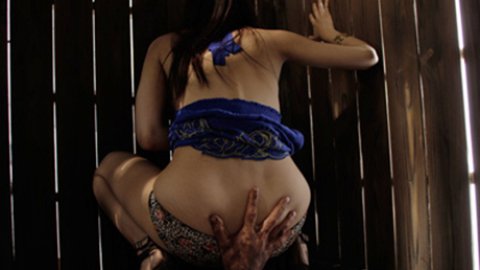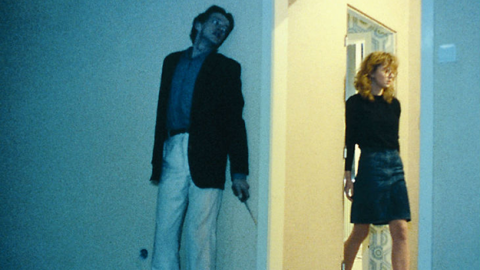2010 International Fantasia Film Festival
The travel itinerary set up by Tourisme Montreal for the mini-press junket attached to the 14th Fantasia Film Festival included a veritable triathlon—jet boating, bike touring, and river surfing. In addition to the various outdoor endurance tests there was even time for a few movies. The main cinematic event—according to me—was Steven Severin performing his score to Blood of a Poet (see FC Sept/Oct 2010). Cocteau’s masterwork functioned as an appropriate aesthetic touchstone for Fantasia, a festival that specializes in all manner of off-the-beaten-path genre weirdness.

1
A significant case in point would be Pater Sparrow’s 1. This creepily hypnotic Hungarian film, adapted from a story by Stanislaw Lem, is barely classifiable (and harder to describe). An investigative team specializing in paranormal phenomena arrives at the scene of a surreal non-crime: a bookstore’s entire stock has been replaced by a seemingly infinite number of a single book. The appearance of the fat tome, composed entirely of endless columns of cryptic statistics, has something to do with a synchronized rash of suicides, a mental-institution conspiracy, telekinetic dolphins, and an Inception-related gizmo-slash-plot device that allows small groups of people to share each other’s dreams. It seems that director Sparrow is attempting to portray psychologically (and convey on a gut level) nothing less than a paradigm shift in world consciousness.
The Serbian film Tears for Sale is far less ambitious than 1, but possessed of a related visual extravagance (both reminiscent of the City of Lost Children aesthetic). In the aftermath of World War I, a remote and ravaged village finds itself bereft of men. The female survivors are uniformly bonkers from both grief and unrequited horniness. Two fiery femmes embark (in a hearse!) on a road-trip mission in search of replacement men in order to satisfy the community’s state of unfulfilled desire. The film’s budget was apparently the most ever spent on a Serbian production (Luc Besson co-produced); yet the project’s saving grace lies not in its impressive special effects but, in a simple human affect: the presence of Katarina Radivojevic, a preternatural talent who seems to magnetically realign every frame she appears in (I believe it has something to do with her eyes).
Yet another Serbian milestone—this year’s Fantasia produced at least three—appeared in the form of comic-book artist Aleksa Gajic’s film debut, Technotise: Edit & I, apparently the country’s first animated feature. The year is 2074. A young psychology student named Edit, under the strain of a heavy course load and an extracurricular job involving the care of an idiot savant, gets a black-market performance-enhancing computer chip implanted in her body. The device works so well that the narrative stage is set for an evolutionary-slash-technological mutation that will feel familiar, and perhaps a wee bit tired, to anyone versed in cyberpunk classicism (does the name Moebius ring a bell?).
Continuing along quasi-nationalist lines, but placing Serbia on hold for a moment, a perverse bit of patriotism came courtesy of Simon Rumley’s Red, White & Blue. The director, a Brit (responsible for The Living and the Dead), set his latest film in Austin, Texas. One reason, as he explained during a Q&A, was the story’s need for a loose-knit community in which a person trying to disappear could and would eventually be found. The person in question is Erica (Amanda Fuller), a nympho-loner on the run from a group of guys intent on punishing her for, in a roundabout bit of reasoning, her promiscuous relations with them. In her corner is Nate (Noah Taylor), a near-homeless near sociopath, and therefore a likely candidate for platonic-lover status. Although not fantasy, nor technically horror—at least by Noel Carroll’s “art horror” definition—the film attains a truly horrific, emotionally charged, literally skin-peeling climax. Post-screening, Fantasia doyens chattered excitedly about character development.

A Serbian Film
Speaking of horrific: there’s a line between a must-see movie and a movie that paradoxically must-be-avoided yet must-be-acknowledged. A Serbian Film, written, as it happens, by the scribe who displayed a slightly lighter touch with Tears for Sale, has been described in the blogosphere as the “non-plus-ultra of shock,” and as “giving new meaning to the term torture porn” for, among other things, its depiction of “newborn rape,” and, in technical cine-terminology, for making “Human Centipede look like A Charlie Brown Christmas.” Truth be told, the thing is not that appalling (its atrocities seem deliberately laughable, at least to this jaundiced eye), is actually rather well made, and owes more than a bit of a spiritual debt to Cronenberg’s Videodrome. The story involves a burnt-out porn star (Srdjan Todorovic) who comes out of retirement for “one last project.” The film-within-the-film has no script—the better to convey the intuitive actions of the actor, as he spontaneously deals with the various grotesqueries the visionary, i.e., nut-job director throws his way. Reality and fantasy merge as the actor becomes subsumed by the nastiness of his role; he begins to love his work; etc.
What makes A Serbian Film nominally interesting, so to speak, is its title. The horror reflexively conjured by the country’s name is intended to serve as, by turns, provocation, a badge of honor, and a mildly ridiculous all-access pass for moral outrage. To paraphrase a statement made by the film’s producer: to be Serbian is to be fucked from birth.






